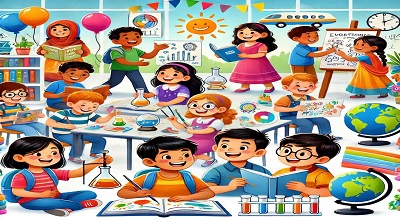Good Learning Experience
A good learning experience is one that is effective, engaging, and meaningful. It promotes understanding, retention, and the application of knowledge or skills. Here are some key characteristics of a good learning experience:
- Relevance: Learning should be relevant to the learner’s goals, interests, and needs. When learners see the value in what they are learning, they are more motivated and engaged.
- Clear Objectives: Learning objectives should be well-defined and communicated to learners. They provide direction and help learners understand what they are expected to achieve.
- Active Engagement: Learners should be actively involved in the learning process. This can include hands-on activities, discussions, problem-solving, and interactive exercises. Active engagement enhances comprehension and retention.
- Feedback: Frequent and constructive feedback is essential for learning. It helps learners understand their progress, identify areas for improvement, and make necessary adjustments.
- Challenge: A good learning experience should strike a balance between being challenging enough to promote growth and manageable enough to prevent frustration. The zone of proximal development (ZPD) concept is relevant here.
- Variety: Incorporating diverse learning activities and resources, such as text, images, videos, and real-world examples, can make learning more engaging and cater to different learning styles.
- Flexibility: Learning experiences should accommodate different learning paces and preferences. Some learners may need more time or alternative approaches to grasp the material effectively.
- Application: Learners should have opportunities to apply what they have learned in real-world contexts. Application reinforces understanding and demonstrates practical utility.
- Reflection: Encouraging learners to reflect on their learning process and outcomes can deepen understanding and promote metacognition (thinking about one’s thinking).
More Read…
Collaboration: Collaborative learning experiences, such as group projects or discussions, can foster critical thinking, communication skills, and exposure to diverse perspectives.
Assessment: Assessments should align with learning objectives and provide opportunities for learners to demonstrate their knowledge and skills. They should be fair, and transparent, and provide valuable insights.
Continuous Improvement: Learning experiences should adapt and evolve based on feedback and assessment results. Continuous improvement ensures that the learning process remains effective and relevant.
Support: Learners benefit from access to resources and support systems, such as teachers, mentors, or online communities, to help them overcome challenges and achieve their learning goals.
Motivation: A good learning experience should cultivate intrinsic motivation, where learners are driven by their own curiosity and desire to learn.
Enjoyment: While learning can be challenging, it should also be enjoyable. Creating a positive and comfortable learning environment can enhance the overall experience.
Ultimately, a good learning experience is one that empowers individuals to acquire knowledge, develop skills, and grow as learners. It should foster a lifelong love of learning and equip individuals to adapt to new challenges and opportunities.
Benefits Of Good Learning
Good learning offers a wide range of benefits that extend beyond simply acquiring knowledge or skills. When learning experiences are effective, engaging, and meaningful, they can positively impact various aspects of an individual’s life. Here are some key benefits of good learning:
- Improved Knowledge and Skills: Good learning experiences enhance a person’s understanding and competence in a particular subject or skill, making them more knowledgeable and proficient.
- Increased Confidence: Successful learning experiences boost self-confidence and self-efficacy. When individuals see that they can learn and master new things, they become more confident in their abilities.
- Critical Thinking: Good learning promotes critical thinking skills, enabling individuals to analyze information, solve problems, and make informed decisions.
- Creativity: Effective learning encourages creativity by exposing individuals to diverse ideas, perspectives, and experiences, which can inspire innovative thinking.
- Adaptability: Learning equips individuals with the ability to adapt to new situations and challenges. This adaptability is valuable in a rapidly changing world.
- Enhanced Communication: Learning experiences often involve communication and collaboration, which can improve interpersonal and communication skills.
- Career Advancement: Improved knowledge and skills can lead to career advancement and greater opportunities for employment and professional growth.
- Personal Growth: Learning is a vehicle for personal growth and self-development. It can help individuals discover their passions and interests.
- Bette r Decision-Making: A well-rounded education and critical thinking skills enable individuals to make better decisions in all aspects of life, including personal, financial, and health-related choices.
- Increased Problem-Solving Ability: Learning equips individuals with problem-solving skills that can be applied to both personal and professional challenges.
Extra Benefits…
- Lifelong Learning: Engaging in good learning experiences fosters a lifelong love of learning. This means individuals are more likely to continue seeking knowledge and self-improvement throughout their lives.
- Increased Empathy: Exposure to diverse perspectives and cultures through learning can lead to greater empathy and a better understanding of others.
- Improved Health and Well-being: Learning about health and well-being can lead to healthier lifestyles and choices, potentially reducing the risk of chronic illnesses.
- Social Connections: Learning often involves interacting with others, which can lead to the formation of meaningful social connections and friendships.
- Community Engagement: Knowledge gained through learning can be applied to community involvement, volunteering, and social change efforts.
- Cultural Enrichment: Learning about different cultures and histories can enrich one’s life by broadening their horizons and fostering appreciation for diversity.
- Increased Problem Awareness: Learning about global issues, such as climate change, poverty, and inequality, can raise awareness and inspire individuals to become active advocates for positive change.
- Leadership Skills: Learning can develop leadership skills, as individuals gain the knowledge and confidence to take on leadership roles in various contexts.
- Personal Fulfillment: Learning can provide a sense of personal fulfillment and satisfaction, as individuals pursue their interests and passions.
- Positive Impact on Society: Collectively, good learning experiences contribute to an informed and educated society, which can lead to positive social and economic outcomes.
In summary, good learning is not just about acquiring information; it’s about personal and societal growth, empowerment, and positive contributions to the world. It is a lifelong journey that enriches every aspect of an individual’s life.
